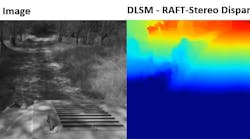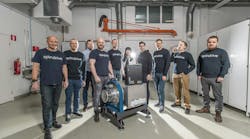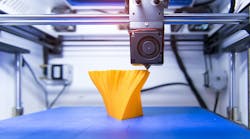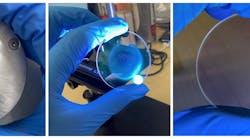Xaba, developers of self-programing, AI-driven “brains” for industrial robots and cobots, has announced it has raised an additional $2M in seed funding from BDC Capital, Hitachi Ventures, and Hazelview Ventures to establish and staff a new robotics lab.
The funding round was led by BDC Capital’s Deep Tech Venture Fund, Hitachi Ventures, and Hazelview Ventures. The investment will be used to establish and staff a new robotics lab and accelerate the delivery of two Xaba manufacturing platforms.
Xaba's two manufacturing platforms—xCognition and xTrude—use proprietary, state-of-the-art industrial artificial intelligence (AI) to provide AI-powered cognitive industrial automation, consistency, robustness, and high execution quality. Its platforms eliminate the need for constant human supervision, reprogramming, and waste.
xCognition is Xaba’s AI-powered software solution. This industrial robotics digital twin captures and models the true physics of any industrial robotics system (elastic, dynamic, mechanical, tooling). This includes workpiece variances both in location and shape, leveraging rules-based language models and multi-modal datasets that capture legacy data and best practices to enable any robotics system to execute tasks such as drilling, welding (MIG, TIG & Laser), assembling, riveting, laser, data acquisition, and more with maximum accuracy, repeatability, and minimum human supervision.
This past year, Xaba partnered with Lockheed Martin and Rolleri Robotic to demonstrate 10 times performance improvements in absolute positioning and 5 times improvements in relative positioning and trajectory accuracy for cobots using Xaba’s manufacturing platforms.
“With the integration of AI-powered cognition and awareness, robots become easy to adopt and profitable for businesses across various tasks and sizes,” said Massimiliano Moruzzi, CEO of Xaba. “With this funding in place, we can now establish our Xaba manufacturing platforms as the go-to solutions for implementing new intelligent robotics, creating automated factories, and developing disruptive new processes and materials.”
The platform leverages innovative proprietary machine-learning algorithms to model the elasto-mechanical-dynamic behavior of industrial robotics and cobots, as well as workpiece variances. This includes variances in location and shape, using proprietary rule-based language models to eliminate coding of robotics programs. xCognition solves the challenges of deploying industrial robots by completely automating how they are programmed and adopted. This solution not only increases accuracy, consistency, and throughput but also significantly reduces the time and costs of robotics deployments.
“AI represents a wave of change in the automation industry, removing significant barriers to technology adoption in manufacturing and other industrial sectors. Xaba is a great example of how the integration of AI is empowering industrial robotics technologies—enabling them to self-generate programs, substantially improve their accuracy and precision, and provide highly valuable feedback to users,” said Thomas Park, lead partner of BDC Capital’s Deep Tech Venture Fund.
“Cognitive systems will be the future of next-generation robotics and Xaba’s AI-based software solution has demonstrated that it can elevate the performance of high-precision robotics such as welding and drilling by enabling adaptive learning, real-time decision-making, and seamless human-robot collaboration,” said Gayathri Radhakrishnan, Partner at Hitachi Ventures. “As a well-known force in this industry, with a strong focus on robotics and manufacturing, an investment in Xaba gives us the ability to explore this domain further.”
Toronto-based Xaba develops new processes and AI-powered software solutions to automate and enable sustainable manufacturing. Its intellectual property uses artificial intelligence (AI) to empower industrial robots and cobots with synthetic cognition. For additional information, visit xaba.ai.










